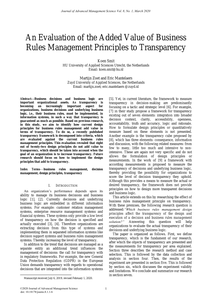This report provides the global community of hospitality professionals with critical insights into emerging trends and developments, with a particular focus on the future of business travel. Business travellers play a pivotal role within the tourism industry, contributing significantly to international travel, GDP, and business revenues.In light of recent disruptions and evolving challenges, this forward-looking study aims not only to reflect on the past but, more importantly, to anticipate future developments and uncertainties in the realm of business travel. By doing so, it offers strategic insights to help hospitality leaders navigate the ever-evolving landscape of the industry.Key findings from the Yearly Outlook include:• Recovery of International Travel: By 2024, international travel arrivals have surpassed 2019 levels by 2%, signalling a full recovery in the sector. In Amsterdam, there was a 13% decrease in business traveller numbers, offset by an increase in the average length of stay from 2.34 to 2.71 days. Notably, more business travellers opted for 3-star accommodations, marking a shift in preferences.• Future of Business Travel: The report outlines a baseline scenario that predicts a sustainable, personalised, and seamless business travel experience by 2035. This future will likely be driven by AI integration, shifts in travel patterns—such as an increase in short-haul trips, longer stays combining business and leisure—and a growing focus on sustainability.• Potential Disruptors: The study also analyses several potential disruptors to these trends. These include socio-political shifts that could reverse sustainability efforts, risks associated with AI-assisted travel, the decline of less attractive business destinations, and the impact of global geopolitical tensions.The Yearly Outlook provides practical recommendations for hospitality professionals and tourism policymakers. These recommendations focus on building resilience, anticipating changes in business travel preferences, leveraging AI and technological advancements, and promoting sustainable practices within the industry.
DOCUMENT

Bill Gates and many others predicted that after Covid, business travel would be largely replaced by online meetings... So what has happened?Article in Strategic Change about business travel to Amsterdam.Shareble link: https://onlinelibrary.wiley.com/share/author/XQUNBW3D7HYBHCVHSYWX?target=10.1002/jsc.2616
DOCUMENT
Why people conduct different sharing about their travel is unclear. Understudied areas include the roles of tourism activity type, tourist well-being, and social context. Under the framework of construal level theory, three studies which combined secondary data and experiments revealed that: 1) challenging (relaxing) tourism activities lead to more desirability (feasibility) sharing; 2) eudaimonia (hedonia) occupy the dominant position and mediate the relationship between challenging (relaxing) tourism activity and desirability (feasibility) sharing; and 3) social context induces the transformation of the relationship between eudaimonia and hedonia, and has a significant moderating impact on the mechanism of travel experience sharing type. Theoretical and managerial implications of travel experience sharing type and mutual transformation between eudaimonia and hedonia are discussed.
DOCUMENT

Research, advisory companies, consultants and system integrators all predict that a lot of money will be earned with decision management (business rules, algorithms and analytics). But how can you actually make money with decision management or in other words: Which business models are exactly available? In this article, we present seven business models for decision management.
LINK
DOCUMENT

Pressure on natural resources, unsustainable production and consumption, inequality and a growing global population lie at the base of the big challenges that people face. This chapter investigates how businesses can take responsibility in dealing with these challenges by means of frugal business model innovation. The notion of ‘frugal innovation’ was first introduced in the context of emerging markets, giving non-affluent customers opportunities to consume affordable products and services suited to their needs. Business modelling with a frugal mindset opens up a path that provides significant value while minimizing the use of resources such as energy, capital and time. Business models require intentional design if they are to deliver aspired sustainability impacts. Diminish or simplify resources can be described as the means to remove or reduce features, resources, required activities and/or waste streams. Decompose can be described as the removal of resources from the commercial value proposition and replacing them with resources the user/consumer already can access or uses. This is an Accepted Manuscript of a book chapter published by Routledge/CRC Press in Circular Economy : Challenges and Opportunities for Ethical and Sustainable Business on 2021, available online: https://doi.org/10.4324/9780367816650
DOCUMENT

Business decisions and business logic are important organizational assets. As transparency is becoming an increasingly important aspect for organizations, business decisions and underlying business logic, i.e., their business rules, must be implemented, in information systems, in such a way that transparency is guaranteed as much as possible. Based on previous research, in this study, we aim to identify how current design principles for business rules management add value in terms of transparency. To do so, a recently published transparency framework is decomposed into criteria, which are evaluated against the current business rules management principles. This evaluation revealed that eight out of twenty-two design principles do not add value to transparency, which should be taken into account when the goal of an organization is to increase transparency. Future research should focus on how to implement the design principles that add to transparency.
DOCUMENT
